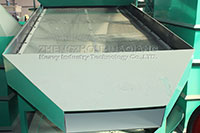
Fertilizer screener machines are core equipment in organic fertilizer production lines. Their performance directly affects the uniformity of fertilizer particles and production efficiency. Proper maintenance extends equipment lifespan, reduces breakdowns, and improves screening accuracy. Here are key maintenance steps to ensure long-term stable operation:
1. Clean Screen Mesh Regularly to Prevent Blockages
Clogged screens are a common issue affecting efficiency. Fertilizer particles, dust, and residues can block screen holes, reducing capacity. Inspect the screen mesh after daily shutdowns. Use compressed air or soft brushes to remove residues. For sticky organic fertilizers, install vibration cleaning devices or replace screens periodically.
2. Check Vibration Motors and Lubricate Bearings
Vibration motors power the fertilizer screener machine. Regularly check if mounting bolts are loose to prevent parts from shaking loose. Lubricate bearings with high-temperature grease every three months to reduce friction. Immediately stop the machine if you hear unusual noises or notice overheating.

3. Inspect Screen Frame and Spring Dampers
The screen frame’s stability determines screening effectiveness. Check regularly for deformation or cracks, and ensure bolts are securely tightened. Worn or broken spring dampers cause unbalanced vibrations, affecting accuracy. Inspect every six months and replace if necessary.
4. Monitor Belt and Transmission Parts
For belt-driven machines: Check belt tension to avoid slipping or snapping. For chain-driven models: Keep chains lubricated and inspect sprocket wear. Replace severely worn parts promptly.
5. Maintenance During Long Shutdowns
If idle for extended periods (such as seasonal shutdowns): Thoroughly clean the machine. Apply anti-rust oil to critical parts. And disconnect power and cover with a dust-proof sheet to protect against moisture and dust.
Following these steps boosts fertilizer screener machine reliability, extends lifespan, minimizes downtime, and ensures efficient fertilizer production. Regular maintenance cuts repair costs and boosts overall productivity, adding greater value to fertilizer businesses.